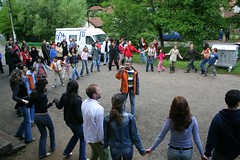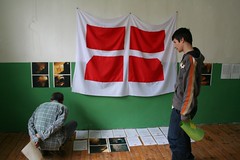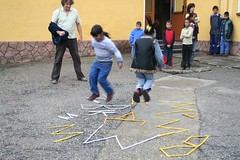
Two cups of fresh milk await us on the kitchen table in the morning. Aunt Rachel went to milk the cow at the grandmother of the Zedník family, where we had spent the night. We have a quick breakfast; we have a busy day ahead of us. In the end, it proves to be even richer than planned. At 9 a.m. we arrive at the local school, which is named after J. A. Comenius. It was built in the 1990s with help from the Czech government and NGOs such as People in Need. The teacher, Mr Skořepa, introduces us to the school principal in an office decorated not only with the Romanian, Czech and EU flags, but also with a NATO flag. Our arrangement is to work with all the children from the first to the eighth grade; the ninth graders are preparing for their final exams. We have about an hour to prepare, to see the school and to talk to the teacher, who very kindly spends his time with us. We peek into the kindergarten; from children’s murals we learn about the history of the Czechs in the Banat. In the library we talk about books, reading and the out-of-place magazines (fashion and gossip magazines such as Květy and Impuls) sent to these expatriate Czechs by the Ministry of Foreign Affairs. The selection of magazines is even more ridiculous considering the fact that the people in Helena are strong believers who live very earnestly and consistently according to almost Old Testament-like principles – working the land, sharing with neighbours, serving God. One odd addition to the Czech school is the air-raid shelter, required by Romanian law and built with Czech money. As a result, two large rooms with toilets cannot be used (the teacher mentioned a clubroom and cinema) so as not to compromise antinuclear cleanliness and safety. Mice do not respect these rules, however, but isn’t a ping-pong table better than mouse droppings. After all, mice don’t play nuclear war. From our conversations with the teacher, we also learn about the Czech minority on the Serbian side (Češsko selo, Běla Cerkva) and their Cyrillic, as well as the difficulties in switching to the Latin alphabet in Czech classes, which are taught by external teachers from Helena and Gernik. We talk a lot about education, the Romanian curriculum for minority schools, the planned secondary school exams in Czech, the success of the Czech-language Olympics, and about the exodus to the Czech Republic. The school is a telling example. Built for 200 pupils, from preschool to ninth grade, the school is attended by some thirty children. During our workshop we get to know almost all of them by first name, playing various games, including our favourites – with letters and rulers, talking about Cyril and Methodius. The children are absorbed in trying to guess which letter is which in the Glagolithic alphabet. One of the older boys, a football player called Štěpán, writes his own line on our Glagolithic sheet. The best part is probably the work itself and the conversations. The children collaborate regardless of age – it is obvious that they are close to each other. Many a teacher in the Czech Republic would be amazed by the peaceful and productive atmosphere. We offer Helena’s children some pictures of ours – the Cyrillic alphabet by the children from Ochrid is a big hit, as is a Czech film which based on Alan Marshall’s Whispering in the Wind. As we are leaving the school, we run into a delegation from Pilsen. The deputy governor is so surprised by our presence that she immediately wants to take a group photo with us. Support is promised, as is cooperation in preserving the “open air museum.” But this isn’t a museum, we were here among interesting people. We share our views with the development programme coordinator for People in Need, Mr Dokoupil, with whom we talk briefly. The fact that Svatá Helena offers an opportunity to experience authentic rural life becomes even clearer to us in a conversation with Uncle Venca and Aunt Rachel; an oral historian would definitely have been excited. We learn about the coexistence of the two churches, about people leaving (and coming back), about Helena’s golden ages and difficult times, about the relationship with other nationalities and about the locals’ relation to Czech culture and language. In the afternoon we have a unique chance to attend a funeral. We are concerned about being outsiders but our friends want to show us how traditions are kept. The whole village gathers. A Catholic funeral is not paid for – everything is contributed by the community, with people digging the grave, carrying the coffin all the way to the churchyard above town, and filling up the grave afterwards. The procession includes both Catholics and Baptists, and the two congregations are buried in the same graveyard with a view of Svatá Helena in one direction and the Danube in the other. Roman receives an extra present – his uncle shows him the place where his stepfather’s house once stood. Then we continue with our journey. There is a long way ahead of us, with a new task for the next day – not to miss Velehrad and Methodius’s grave. As we are leaving, we encounter a group of tourists drinking beer outside Helena’s grocery shop. The things that we experienced must have escaped their attention. And then we’re in Moldova Nuova, where we had previously spotted a friendly shop with a sufficient supply of cheap vegetable oil. With the help of a Serbian shop assistant, we strike a good deal. This just increases our disappointment when we realise that our car’s troubles are only getting worse. Several metres out of the parking lot our blue Methodius suddenly comes to a stop. A filter deformed by heat has begun to aerate the engine – which we don’t learn until later, since none of our two-member crew is an expert car mechanic. Not only that, but the sky is overcast and it begins to rain. But like a miracle – the car starts just as are getting ready to look for someone to tow us back to Helena. From then on, things only get better. In Timisoara, we manage to find the recommended shortcut to Hungary. Overjoyed, we go to sleep at a nice petrol station in Hungary. We even catch up with our journal, at least on the computer.




